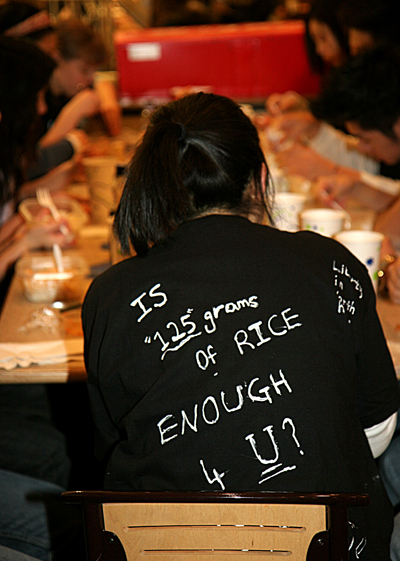
Members of Binghamton University’s chapter of Liberty in North Korea (LiNK) ‘ a non-profit, non-partisan, non-ethnic and non-religious group that seeks to raise awareness about and humanitarian aid for North Koreans and North Korean refugees ‘ began a fast on Friday, Feb. 1 at 7 p.m., which will last for 10 days. Participants will live off of 250 grams of rice and a multi-vitamin each day. The fast is an attempt to raise awareness about the ‘Shenyang Six,’ a group of six North Korean refugees, including two orphan boys and four women, whose imprisonment in Shenyang, China, violates the international convention regarding the status of refugees.
LiNK’s fast, which is taking place at colleges across the nation, is one of the organization’s many efforts to advocate human rights for citizens and refugees of North Korea. LiNK was founded at Yale University in 2004, and within a month of its launch, the organization had more than 40 collegiate chapters nationwide.
According to sophomore Michelle Lee, co-coordinator of BU’s chapter of LiNK, the split between North and South Korea as well as the torture experienced by refugees leaving North Korea ‘ including maiming of the legs so that they can no longer attempt to escape the country on foot ‘ is something that ‘touches all of us [in LiNK].’ She hopes that the fast will ‘raise awareness with all groups: students, administrators and teachers.’
In addition to raising awareness about conditions of torture, sex trafficking, malnutrition, sexual exploitation and starvation within North Korea, LiNK has also created programs such as Project Safe Haven, which shelters North Korean orphans in China, and Project Hope Net, which provides shelter, counseling and medical attention to women who have been sexually trafficked.
BU’s own chapter of LiNK was founded in the spring of 2006, and the group now has about 100 members. Their work focuses largely on screenings, seminars, discussion forums and publicity stunts, in addition to continuously attempting to raise funds for the program through tabling and donations.
Sophomore Amy Lee, LiNK’s secretary, said that the fast has about 20 participants, all of whom meet for dinner each night at a different dining hall, where they eat 125 grams of rice and are given an additional 125 grams to eat for breakfast the next morning. Fast participants, who can be identified around campus by the black ribbons they are wearing to support the cause, will be accepting monetary donations all week and are also ‘open to answering any questions about LiNK and the North Korean diet,’ Lee said.
Fast participants plan to observe the limitations of the diet throughout the entire 10-day period. Michelle Lee, who ‘hopes people will stick to their diet[s],’ said that LiNK’s e-board ‘doesn’t want people to take it too strictly,’ adding that participants can drink liquids, such as coffee and juice, in addition to their rations. However, sophomore Adam Hong, another fast participant, stated that e-board members plan to eat nothing at all for the final 30 hours of the fast. When asked about potential risks to students participating in the fast, Michelle Lee said that a campus nutritionist ‘suggested that we shouldn’t do this,’ adding that all participants had to sign liability forms so that the organization is not responsible for any issues that may arise.
Hong stated that despite the risks of fasting, ‘doing something like this definitely attracts more attention than just tabling or talking about it. Actions speak louder than words.’ Hong explained that last semester, LiNK organized ‘Operation Drop Dead,’ in which students simultaneously fell down and remained on the ground in front of Bartle Library, symbolizing lives lost in North Korea. ‘Stunts like that attract more awareness,’ Hong said. ‘Because people are actually seeing us doing this, more and more people are joining and we’re doing something to help out those that are less fortunate than us.’
BU students can help LiNK out by making monetary donations throughout the remainder of the fast, which ends on Saturday, Feb. 10. A $4 donation, for example, provides monthly meals for four children in North Korea, and a donation of 75 cents can save seven children from dying of a common cold.


